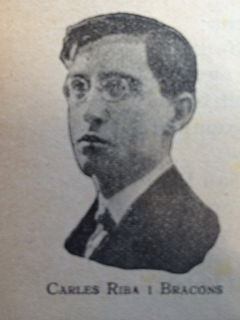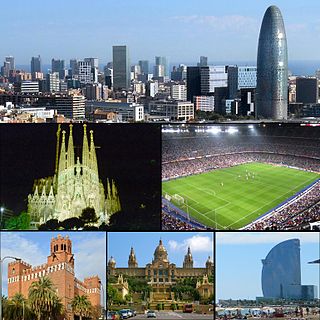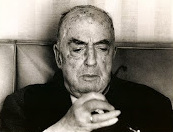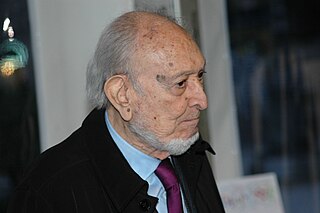The Bierville Elegies (Catalan : Les elegies de Bierville) is the most outstanding work by the Catalan poet Carles Riba. Once Riba and his family embarked on the path of exile in France at the end of the Spanish Civil War, they settled first in the castle of Bierville (Boissy-la-Rivière) and there, between March and July 1939, began to be created what were later to become the Elegies. The work was continued between July 1939 and June 1940 in L'Isle-Adam, then for eight months in Bordeaux and given final shape in Montpellier, where he settled. [1] Along with Nabí by Josep Carner and Antigone by Salvador Espriu, The Elegies of Bierville constitute one of the great works of modern Catalan literature and the prime postwar pieces marked by the political situation.

Catalan is a Western Romance language derived from Vulgar Latin and named after the medieval Principality of Catalonia, in northeastern modern Spain. It is the only official language of Andorra, and a co-official language of the Spanish autonomous communities of Catalonia, the Balearic Islands and Valencia. It also has semi-official status in the Italian commune of Alghero. It is also spoken in the eastern strip of Aragon, in some villages of Region of Murcia called Carche and in the Pyrénées-Orientales department of France. These territories are often called Països Catalans or "Catalan Countries".

Carles Riba i Bracons was a Catalan poet, writer and translator.

France, officially the French Republic, is a country whose territory consists of metropolitan France in Western Europe and several overseas regions and territories. The metropolitan area of France extends from the Mediterranean Sea to the English Channel and the North Sea, and from the Rhine to the Atlantic Ocean. It is bordered by Belgium, Luxembourg and Germany to the northeast, Switzerland and Italy to the east, and Andorra and Spain to the south. The overseas territories include French Guiana in South America and several islands in the Atlantic, Pacific and Indian oceans. The country's 18 integral regions span a combined area of 643,801 square kilometres (248,573 sq mi) and a total population of 67.3 million. France, a sovereign state, is a unitary semi-presidential republic with its capital in Paris, the country's largest city and main cultural and commercial centre. Other major urban areas include Lyon, Marseille, Toulouse, Bordeaux, Lille and Nice.
Written between 1939 and 1942, the Elegies were published in Barcelona after a year in an edition that bore the imprint of Buenos Aires and dated as 1942; this edition was shortened, however. In 1949 in Santiago, Chile the first complete edition of the work was published, but the distance meant that this work was unknown to the Catalan public. Finally, the complete edition came out in 1951 in Barcelona and quickly made a big impact.

Barcelona is a city in Spain. It is the capital and largest city of Catalonia, as well as the second most populous municipality of Spain. With a population of 1.6 million within city limits, its urban area extends to numerous neighbouring municipalities within the Province of Barcelona and is home to around 4.8 million people, making it the sixth most populous urban area in the European Union after Paris, London, Madrid, the Ruhr area and Milan. It is one of the largest metropolises on the Mediterranean Sea, located on the coast between the mouths of the rivers Llobregat and Besòs, and bounded to the west by the Serra de Collserola mountain range, the tallest peak of which is 512 metres high.

Buenos Aires is the capital and largest city of Argentina. The city is located on the western shore of the estuary of the Río de la Plata, on the South American continent's southeastern coast. "Buenos Aires" can be translated as "fair winds" or "good airs", but the former was the meaning intended by the founders in the 16th century, by the use of the original name "Real de Nuestra Señora Santa María del Buen Ayre". The Greater Buenos Aires conurbation, which also includes several Buenos Aires Province districts, constitutes the fourth-most populous metropolitan area in the Americas, with a population of around 15.6 million.
In the Elegies the poet melts three very different realities, which are fostered by loneliness and lack of history of the landscape of Bierville and become almost legendary: the poet's self, that of his people, and a common homeland of Greece, to which the poet is now traveling, now that he is not in his own homeland. It is, in fact, a spiritual adventure, represented through a journey into the past powered by the memory, preferably with an image of the sea, which ends in the penultimate elegy in the collection, which has been considered a kind of a spiritual song, with the rediscovery of own identity and personal divinity of God and of the collectivity. This religious dimension, which until then was not present in Riba's poetry, penetrated deeply throughout his thinking, including the conception of literature. That dimension appeared again in the later poetic works as Savage Heart (Salvatge cor) and Sketch of Three Oratorios (Esbós de tres oratoris).

Greece, officially the Hellenic Republic, historically also known as Hellas, is a country located in Southern and Southeast Europe, with a population of approximately 11 million as of 2016. Athens is the nation's capital and largest city, followed by Thessaloniki.












